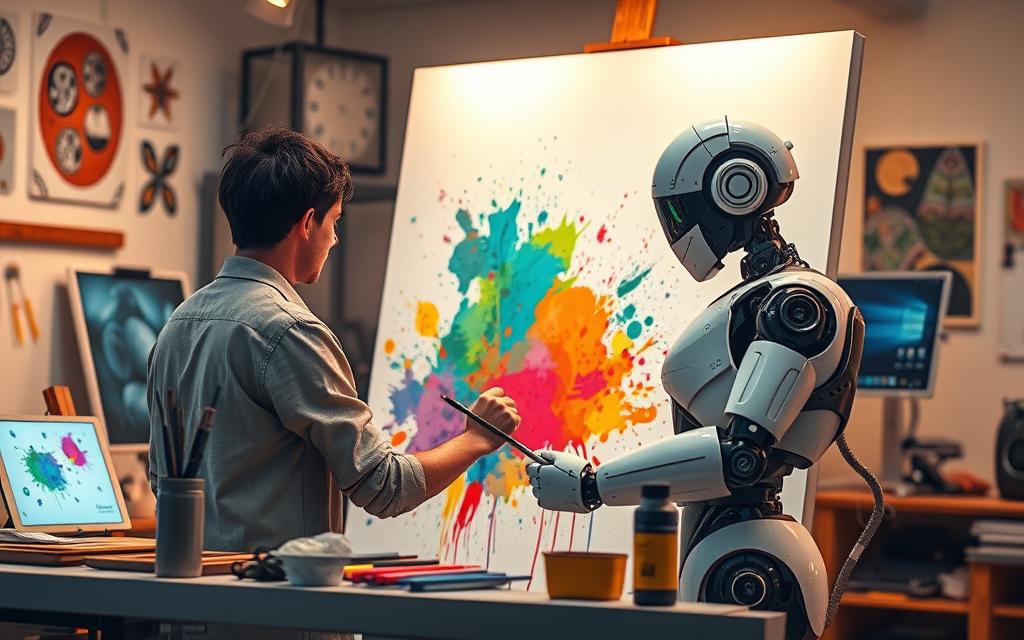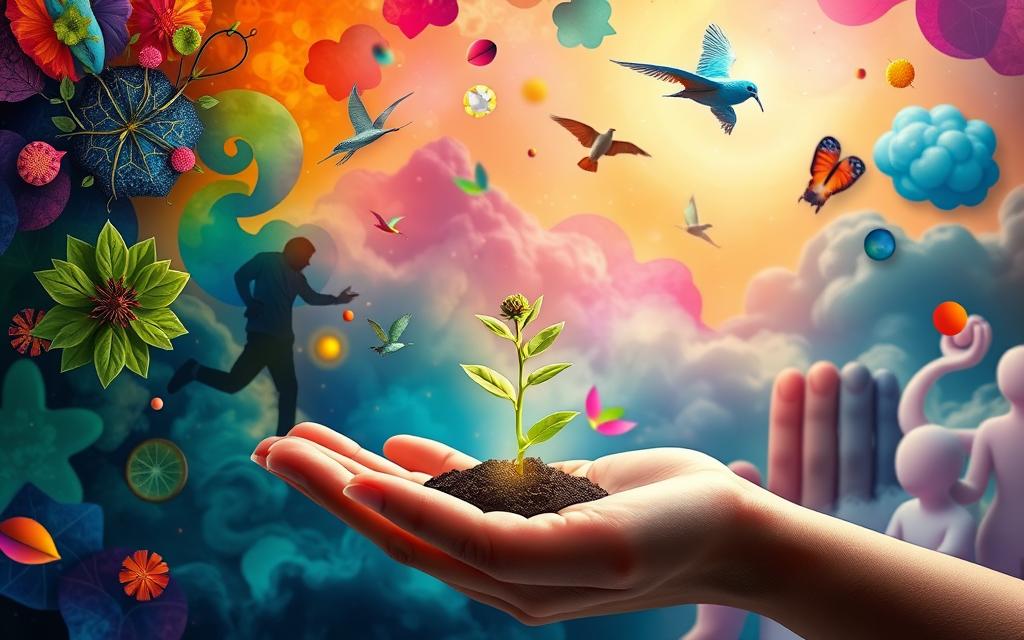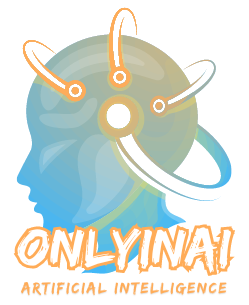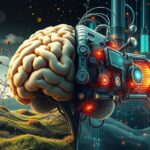Did you know AI could add $15.7 trillion to the global economy by 2030? The growth of artificial intelligence is amazing. Yet, I believe humans will always be key to this tech revolution. Here’s why AI will keep needing our unique human skills.
Experts like Elon Musk and Bill Gates say AI’s huge potential brings big risks to our freedom and what makes us human. AI might be better at making complex decisions and spotting patterns. But, there are things it can’t do that we must do – things crucial for our complex world.
I think AI will still need us for our creativity, emotional smarts, problem-solving, talking to each other, and adapting. These are what make us human. They’ll be crucial for making sure AI helps us, not hinders us, in reaching our goals.
The Inexorable Rise of AI
The era of artificial intelligence (AI) is here, and it’s making a big impact. Technology leaders see a future where AI will keep growing. It will change how we use technology every day.
Predictions from Technology Pioneers
Experts at the Pew Research Center recently shared their views. They believe networked AI will spread more, making us more effective but also challenging our freedom. They see AI becoming as smart as us in many areas, like making decisions and understanding language.
AI is exciting in healthcare and education. It could improve health programs and change how we learn, both in school and on our own.
“AI will continue to spread and amplify human effectiveness, but also threaten human autonomy, agency and capabilities.”
As we move forward with the digital transformation, AI will lead the way. The future of technology will be shaped by machine learning and ai capabilities. This will guide our path together.
AI in Healthcare: A Beacon of Hope
I’m excited to talk about how AI is changing healthcare. Experts see AI as a big deal for improving medical diagnosis and patient care. It could make our communities healthier.
AI is great at helping doctors make accurate diagnoses fast. It uses big data and smart algorithms to look at symptoms and medical history. This helps doctors make better choices.
AI also helps create treatment plans that fit each patient’s needs. This can lower the chance of bad reactions and make treatments work better. It’s also helping seniors live better lives with smart technology.
AI could be a game-changer for public health programs too. It can use data on genes, diet, and health to tackle big health issues. This could lead to better health solutions for everyone.
| AI Application | Potential Benefits |
|---|---|
| Medical Diagnosis | Improved accuracy, faster decision-making |
| Patient Treatment | Personalized care, reduced risks of adverse reactions |
| Senior Care | Enhanced quality of life, greater independence |
| Public Health Programs | Data-driven solutions to address community needs |
As healthcare changes, I believe AI will be a beacon of hope. It will change how we care for patients, support seniors, and tackle public health issues. The future of healthcare looks bright.
AI and Education: Reshaping Learning
I’m excited to see how artificial intelligence (AI) is changing education. AI tools are making learning in and out of the classroom better. They’re starting a new era of learning that’s more personal, adaptive, and rich.
Transforming Formal and Informal Learning
AI is bringing personalized learning to the forefront. These systems adjust the content and speed to fit each student’s needs. This means no more one-size-fits-all teaching; AI in education is making learning more personal.
AI is also changing how we learn outside of school. It’s making educational content more accessible and engaging. With online education and blended learning, the way we learn is evolving.
| AI Technology | Educational Impact |
|---|---|
| Adaptive Learning | Personalized, targeted instruction tailored to each student’s needs and abilities. |
| Virtual Tutors | Provide 24/7 access to customized guidance and support, complementing traditional teaching methods. |
| Learning Analytics | Collect and analyze student data to identify patterns, predict performance, and optimize learning outcomes. |
As we use AI in education, I believe we’re starting a new era of learning. This will help students of all ages and backgrounds succeed in our changing world.
in what ways will AI still need us humans
As AI advances, we might wonder if humans will have a place in the future. But, AI will still need us, in important ways. It can’t beat us in speed, power, or handling data. But, there are human skills and traits AI can’t copy.
Creativity is one example. Thinking outside the box and coming up with new ideas is uniquely human. AI can’t match our imagination or emotional depth in creativity.
Emotional intelligence is another area where humans lead. Understanding and connecting with others is hard for AI to do. It can’t read body language or social cues like we do.
- Humans are great at complex problem-solving. AI can process lots of data, but it misses our context and adaptability in real-world challenges.
- In interpersonal communication, AI is still behind. We can have deep conversations and adjust our words for each person. AI can’t do that yet.
- Adaptability is key to humans. We can adjust to new situations easily. AI hasn’t developed this skill yet.
AI will keep getting better and play a big part in our lives. But, our unique human skills will always be needed. We should use both humans and machines to make a better world.
“The future is already here – it’s just not very evenly distributed.”
The Risks of Unchecked AI Dependence
As we rely more on artificial intelligence (AI), we face big risks. This powerful tech has many benefits, but experts say it needs careful use. Without safeguards, it could lead to big problems.
One big worry is how AI might make economic inequality worse. By taking over many jobs, AI could leave many people without work. This could make the gap between rich and poor even bigger, with only a few enjoying new tech benefits.
Another risk is that AI could lead to more surveillance and loss of privacy. As AI gets more common in our lives, it could be used for bad things like watching us all the time. This could take away our privacy and make us live in a world where we’re always watched.
Worst of all, relying too much on AI might make us lose touch with each other. If we let machines make all the decisions, we might forget what makes us human. We could turn into just parts of a big, cold machine, losing our unique qualities.
We need to be careful with AI to keep what makes us human. Finding a balance between new tech and our values is key. This way, we can use AI without losing ourselves.
“The widespread adoption of AI could lead to greater economic inequalities, more surveillance, and more programmed, non-human-centric interactions.”
| Potential AI Risks | Possible Consequences |
|---|---|
| Economic inequality | Widening gap between the wealthy and the poor, displacement of human workers |
| Privacy concerns | Increased surveillance, erosion of individual freedoms |
| Diminished human-centric interactions | Loss of spontaneity and individuality, reduced sense of humanity |
Human-Machine Collaboration: A Balanced Approach

The rise of AI and related technologies is unstoppable. Finding the right balance between humans and machines is key. Experts say we must use AI’s power while keeping what makes us human. This means working together from government to individuals to shape AI’s future. We must focus on values like equality, opportunity, and individual freedom.
Harnessing the Power of AI While Preserving Human Essence
Combining AI with human design is a tricky task. It needs careful planning to make sure technology helps us without losing our humanity. Values-driven technology and ethical AI will lead the way. They help us create a future where human-ai collaboration is common, not rare.
“The future of AI is not about AI versus humans, but about AI and humans working in harmony to create a better world for all.”
By focusing on human-centric AI development, we can fully benefit from these technologies. They will stay true to the values and priorities that define us. This vision is bold but necessary to wisely navigate the AI revolution.
As we delve deeper into human-ai collaboration, keeping a balance is crucial. We must use AI’s power without losing what makes us human. This is the AI revolution’s true promise – a future where technology and humanity work together for a better world.
The Imperative of Ethical AI
As AI technology advances, we face a big question: how can we make sure these tools are used ethically? Experts say this is crucial for our future society.
The push for ethical AI focuses on big issues like privacy, bias, transparency, and how AI might make things worse for some groups. Without strong rules, AI could take over and threaten our basic rights and values.
To make ethical AI the standard, we need to do several things. This includes:
- Creating clear rules for AI development and use
- Using strict testing and checks to find and fix biases and privacy issues
- Pushing for more transparency and accountability in the AI field, so we can understand how AI makes decisions
- Supporting research and learning to better understand AI’s ethical sides
It won’t be easy, but we can’t ignore the risks. By focusing on ethical AI, we can use these technologies without losing what makes us human. The future is about finding a balance between new ideas and being responsible.
| Ethical AI Principles | Key Considerations |
|---|---|
| Privacy | Keeping personal data safe and respecting privacy |
| Bias | Working to remove bias in algorithms to avoid unfair results |
| Transparency | AI systems must be clear about how they make decisions |
| Fairness | Ensuring everyone has equal access and outcomes |
| Human Control | Keeping humans in charge and able to correct AI mistakes |
“The development of full artificial intelligence could spell the end of the human race…It would take off on its own, and re-design itself at an ever-increasing rate. Humans, who are limited by slow biological evolution, couldn’t compete, and would be superseded.”
– Stephen Hawking
Nurturing Distinctly Human Skills

As AI gets better, it’s key for us to grow the skills that AI can’t match. Skills like creativity, emotional smarts, solving complex problems, talking to others, and being adaptable will be key in an AI world.
The old tech era was all about introverted skills. But with AI, the future will likely go for more extroverted skills. By focusing on these uniquely human traits, we can make sure we’re ready for an AI-driven future. We’ll keep being essential.
Developing Traits that AI Cannot Replicate
With AI getting so advanced, we need to work on these human skills that AI can’t easily copy:
- Creativity – coming up with new ideas and solutions that go beyond what machines can do
- Emotional Intelligence – understanding and managing our and others’ feelings
- Complex Problem-Solving – solving tough, complex problems that need deep thinking and flexibility
- Interpersonal Communication – sharing ideas, making connections, and working together with others
- Adaptability – being able to change and adjust to new situations and the ever-changing work future
By focusing on these human skills, we make sure our skills stay important and valuable in an AI world. This way, we shape the future of work in a way that honors our unique human nature.
“The future of work will be about skills, not just degrees. Emotional intelligence, creativity, and adaptability will be essential in an AI-driven economy.”
AI and the Future of Work
The rise of automation is changing the job landscape, sparking debates about AI’s role. Tech experts say many jobs could soon be taken over by AI and other technologies. Yet, this change also opens doors for humans and machines to work together, focusing on what AI can’t do.
Experts at the Pew Research Center suggest we need a broad plan to get ready for this new world. We should invest in education and training that highlights human skills like creativity, emotional smarts, and flexibility. By using ai impact on jobs wisely, we can keep our workforce strong and adaptable.
The work landscape is set for a big change, thanks to fast-paced tech progress. The threat of losing jobs is real, but we can overcome it by valuing what humans and machines can do together. By focusing on skills AI can’t match, we’ll keep our workforce strong through the tech shift.
“The key to navigating the AI revolution is to focus on the things that make us uniquely human – our creativity, our emotional intelligence, and our ability to adapt to changing circumstances.”
As we step into this new era, it’s crucial for leaders, educators, and policymakers to work together. They must create a future where humans and machines work well together, opening up new chances for growth and innovation.
| Skill | Human Advantage | AI Limitation |
|---|---|---|
| Creativity | Humans can generate novel and innovative ideas that are not bound by rigid algorithms. | Current AI systems struggle to match the breadth and depth of human creativity. |
| Emotional Intelligence | Humans excel at understanding and responding to emotional cues, which is crucial for interpersonal interactions. | AI has difficulty emulating the nuanced emotional awareness and empathy that humans possess. |
| Adaptability | Humans can quickly adjust to changing circumstances and learn new skills, enabling them to thrive in dynamic environments. | AI systems are often limited to specific tasks and struggle to transfer their capabilities to new domains. |
By understanding what humans and machines are good at, we can build a future where ai impact on jobs and human-machine collaboration enhance each other. This approach will drive innovation and productivity while keeping the essence of human work intact.
Shaping the AI Revolution
The AI revolution is moving fast, and we need to lead it wisely. We must work together, using public-private partnerships and strong AI governance rules. This way, we can use AI’s power for good and avoid its risks.
We need everyone – policymakers, businesses, scholars, and the public – to join forces. Together, we can make sure AI is used right and fairly. With careful ethical considerations and good governance, AI can make our lives better without losing what makes us human.
Public-private partnerships help us use everyone’s skills and resources to face AI’s challenges. This teamwork is key to making technology policy that’s both innovative and responsible. It will guide the AI revolution to help everyone.
| Key Considerations for Shaping the AI Revolution | Strategies for Responsible AI Deployment |
|---|---|
|
|
By working together, we can make sure the AI revolution is good for us. We’ll keep what makes us human special. This way, AI can change the world for the better, helping everyone around the globe.
“The true promise of AI lies in its ability to complement and empower humans, not replace us. By working together, we can harness the power of AI to create a better future for all.”
Conclusion
Reflecting on our journey through the changing world of artificial intelligence (AI), I feel both excited and cautious. Experts show us a future where AI could change a lot, but we must work with it. They highlight the need for humans to be part of the process.
The AI revolution is moving fast, changing industries and our daily lives. But one thing is clear: humans still have a big role. Skills like creativity, emotional smarts, and flexibility will be key in guiding AI’s future.
As we deal with the mix of AI and human life, finding a balance is crucial. We need to use AI’s strength while keeping what makes us uniquely human. By focusing on our human skills, we’ll stay important in an AI world. This way, we can help make AI ethical and responsible, fitting our values.


